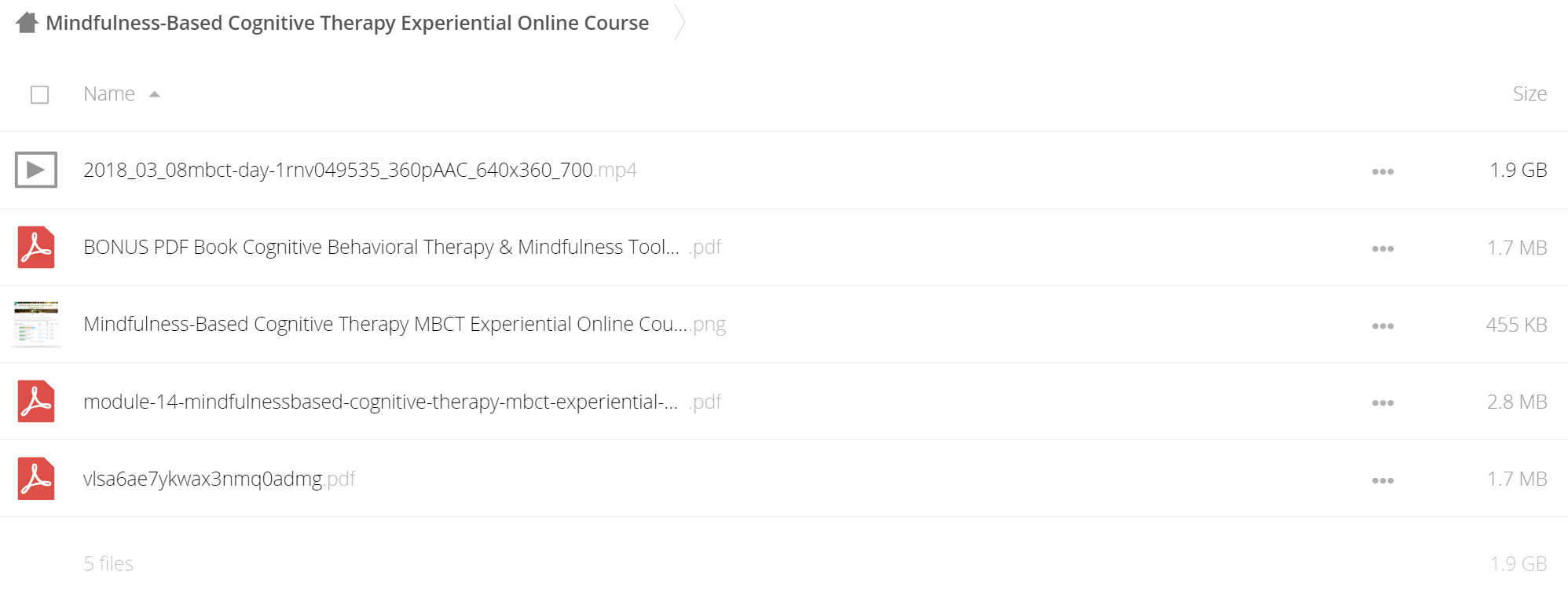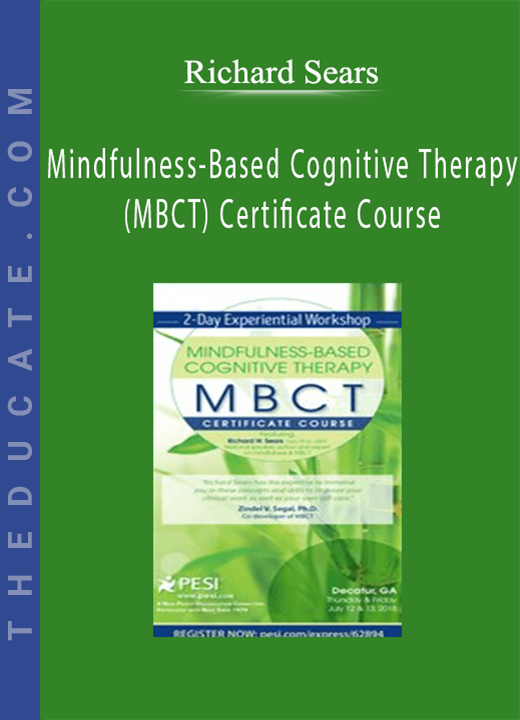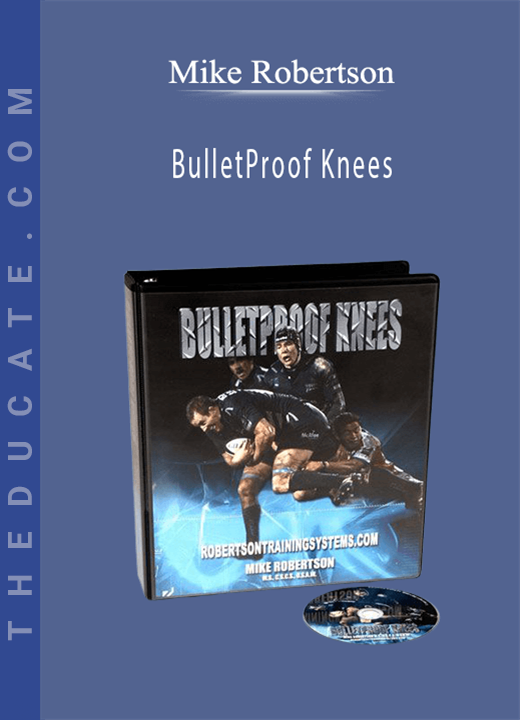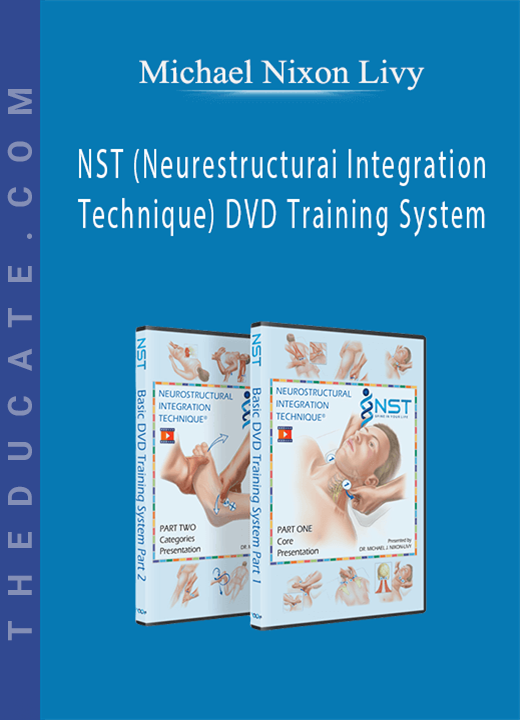Description

Mindfulness-Based Cognitive Therapy (MBCT) Certificate Course – Richard Sears
Mindfulness will offer your client a better quality of life…if you can effectively integrate it into your practice.
But like many clinicians, you might be frustrated with mindfulness because you don’t have concrete, practical ways to incorporate it for specific situations and symptoms such as PTSD, anxiety, chronic pain, addictions, and depression.
This is the course that will finally teach you exactly how to combine mindfulness and cognitive therapy techniques, to transform your practice—and your life.
Join expert trainer Dr. Richard Sears for a unique online certificate course to master the evidence-based Mindfulness-Based Cognitive Therapy (MBCT) approach for specific situations and symptoms, such as PTSD, anxiety, chronic pain, addictions, depression, and MORE!
You’ll learn the core competencies of the MBCT approach, including the step-by-step 8-session structured program to use with both individual clients or group therapy.
End this course with your Certificate in Mindfulness-Based Cognitive Therapy and the complete framework for integrating advanced, clinical mindfulness strategies in your very next session.
This practical and thorough online certificate training provides a session-by-session guide to incorporating MBCT therapy in your clinical practice. With its sound examples and evidence-based strategies for specific conditions, this course will prepare you to effectively use MBCT with clients struggling with stress, bipolar disorder, chronic pain, anxiety, PTSD, addiction and more…
Here’s what you’ll learn to do in this certificate training…
- Enhance therapeutic efficiency and outcomes by understanding the mechanisms that make mindfulness techniques effective for stress, depression, anxiety, trauma, pain, and addiction.
- Stop rumination thoughts and behaviors in clients by breaking down the role of thoughts in perpetuating symptoms of stress, anxiety, and depression.
- Engage your clients with understandable explanations of how the brain changes with mindfulness practice.
- Refine the evidence-based principles of Cognitive-Behavioral Therapy (CBT) by integrating mindfulness practice.
- Alleviate clients of intrusive, obsessive-compulsive thoughts by incorporating mindfulness practices into traditional CBT thought records.
- Help clients disengage from the narrative of negative thoughts and emotions through specific mindfulness-based techniques.
- Organize the eight-session MBCT program for use in your own clinical setting.
- Avoid clients’ cycles of struggling with distressing thoughts and feelings by learning to guide clients through a 3-minute mindfulness exercise.
- Reduce worry and rumination through the use of decentering skills.
- Help clients quickly internalize the skills and attitudes that allow them to let go of struggle and make conscious choices by applying the 3 steps of the mindful inquiry process.
- Adapt the MBCT curriculum to different client populations, including children, as it relates to treatment considerations.
Through four comprehensive and experiential video modules, you’ll immerse yourself in the entire 8-session, structured MBCT curriculum. Expert trainer Dr. Richard Sears will guide you through the core competencies of MBCT, using passion, humor, and wisdom from his 30 years of teaching mindfulness. He will show you proven strategies and techniques to help a wide range of psychological disorders, including PTSD, anxiety, depression, and more.
Module One:
Core competencies of MBCT
In Module one, you’ll gain a foundational understanding of MBCT — including its core principles and evidence-based methodology — so you can discover its full potential for healing. In this module, you’ll learn…
- Foundations of MBCT: Going beyond Mindfulness-Based Stress Reduction (MBSR)
- Neurological evidence for MBCT
- Principles of MBCT, including adaptation and expansion of CBT principles and mindful inquiry
Module Two:
MBCT Curriculum & Core Therapeutic Tasks, Part I
In Module 2, you’ll begin the step-by-step process of implementing the MBCT approach in your clinical work. Dr. Sears will guide you through the first two sessions of the MBCT curriculum where you’ll experience practical exercises and techniques that you can immediately implement with your clients. In this session, you’ll explore…
- Session 1: Awareness and Automatic Pilot
- Raisin exercise — distinguish thinking and feeling
- Body scan — foundation to build attention
- Mindfulness of daily activities
- Session 2: Living in Our Heads
-
- ABC model for linking thoughts and emotions
- Pleasant events calendar to foster attention to the positive
- Mindful breathing for stress and focus
-
Module Three:
MBCT Curriculum & Core Therapeutic Tasks, Part II
This module is packed full of experiential exercises and demonstrations to help you quickly and effectively implement the power of MBCT into your practice. In this module, Dr. Sears will lead you through the next two sessions of the MBCT curriculum to learn techniques that you can use with your clients in your office or empower them to practice on their own.
- Session 3: Gather the Scattered Mind
- Mindful stretching for working with discomfort
- Mindful walking for dynamic mindfulness
- Unpleasant events calendar to relate differently to difficulty
- 3-Minute breathing space
- Session 4: Recognize Aversion
- Mindfulness of breath, body, sounds to deepen awareness
- Working with difficulties without struggle
Module Four:
MBCT Curriculum & Core Therapeutic Tasks, Part III
In this last module, Dr. Sears will guide you through the final sessions of the MBCT curriculum, fully preparing you with proven strategies to overcome PTSD, anxiety, chronic pain, addictions, and more. He’ll also arm you with advanced strategies for working with even your most challenging clients. In this session, you’ll get access to…
- Session 5: Allow/Let Be
- Exposure to difficult thoughts and feelings to transform them
- Notice thoughts without getting lost in them
- Session 6: Thoughts are Not Facts
- Purposefully exposing to strong thoughts and feelings
- Techniques for working wisely with difficult thoughts
- Session 7: How Can I Best Take Care of Myself?
- Recognize relapse signatures to prevent future problems
- Develop self-care action plans
- Session 8: Maintaining and Extending New Learning
- Personalize mindfulness practices for individual clients
- Maintain momentum of positive gains
- Clinical Issues – Advanced Strategies for Working with Challenging Clients
- Adaptations of MBCT for depression, stress, anxiety, chronic pain, PTSD, substance use disorders, children & adolescents







8 reviews for Mindfulness-Based Cognitive Therapy (MBCT) Certificate Course – Richard Sears
There are no reviews yet.